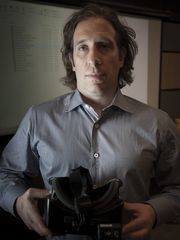 “If you’re exposed to stimuli without giving your body reinforcement (in the form of drugs), you kill the link, which in psychological terms is called extinction,” says Bordnick, associate dean of research at the university’s Graduate College of Social Work.
“If you’re exposed to stimuli without giving your body reinforcement (in the form of drugs), you kill the link, which in psychological terms is called extinction,” says Bordnick, associate dean of research at the university’s Graduate College of Social Work.
“The truth is we don’t know what VR does to the brain yet, in part because the best brain studies require MRIs where the head needs to be still, and that’s not happening with VR,” says Bailenson.
“But I can tell you that after working in VR for 20 years, I never spend more than 20 minutes (with a headset on) at a time,” he says, noting that it is typical to feel somewhat ill after being deprived of real-world stimuli for long periods of time.
At UCLA, neurophysicist Mehta's lab rat studies indicate that when the animals walk down a corridor in VR, 60% fewer neurons fire than when the rats walk the same hall in reality.
“Is this good or is this bad? It’s not clear yet,” he says. “But these are very surprising things in that we haven’t really seen the brain behave this way. I’d be happier if more studies were done to test the consequences of VR.”
Mehta says he has reached out to a variety of headset manufacturers with his research. Some have expressed interest in the results, but he has yet to get any to help fund more in-depth research. VR headsetmakers Oculus Rift, Sony and HTC declined to comment for this story.
See the full story here: http://www.usatoday.com/story/tech/news/2016/02/02/virtual-reality-promise-and-concerns-both-loom-large-researchers/79360096/